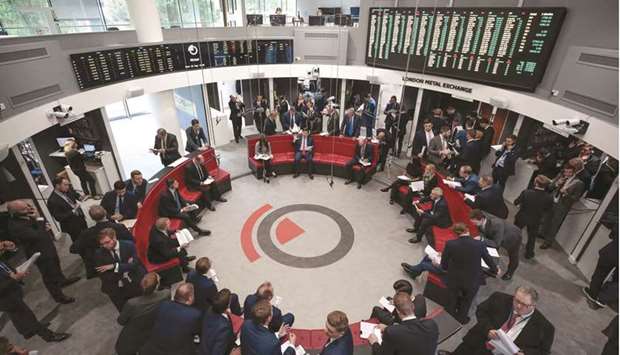The London Metal Exchange has cancelled a plan to close its open-outcry trading floor after a backlash from major users, and will reopen “the Ring” in September.
The decision represents a lifeline for one of London’s oldest financial institutions, and one of the world’s last open-outcry markets.
The Ring traces its origins back to the early 1800s, and still has staunch supporters in the metals industry who say that the daily shouting match between floor traders remains the best way to establish global benchmark prices.
The LME suspended trading in the Ring as the UK went into lockdown last March, and switched to an electronic system to establish daily benchmark prices.
It announced plans to make the change permanent in January, but the move was met with heavy resistance from brokers and users who said the closing of the floor has hurt trading volumes and made pricing less robust.
The LME has not changed its views on the Ring, chief executive Matthew Chamberlain told reporters. However, the decision reflects that “we can’t be the sole arbiters of the best interests of the market: we must listen to what the market actually thinks.” While the trading floor’s reopening will be a victory for the so-called Ring dealers – nine brokers that have the right to trade on the floor – the LME included a concession to those pushing for change.
End-of-day closing prices, which financial institutions use to value their positions, will continue to be set using an electronic process, potentially eliminating an important source of revenue for the Ring dealers.
When it reopens September 6, the Ring will be used to establish so-called official prices, which are heavily relied on in the physical industry.
The LME also said it will consult on rules that would allow it to close the Ring automatically in certain scenarios – if the number of active Ring-dealers falls below six, for example.
There have been doubts about the future of the Ring ever since electronic trading took off on the LME in the early 2000s, but it’s endured far longer than many rival pits. The New York Mercantile Exchange and the International Petroleum Exchange closed their oil-trading floors years ago, while CME Group last month said it will keep its agricultural options pits in Chicago closed, marking the end of an era for open-outcry trading in US commodities markets.
Advocates for the Ring say that it’s the best way to price the LME’s unique suite of daily, weekly and monthly contracts, which are popular among industrial users looking for a precise hedge against their purchases and sales. Critics have said that the LME’s alternative electronic-pricing process is running far less smoothly, and has exacerbated wild price moves in illiquid contracts.
The market’s input was important because the LME has a tradition of consultation on major reforms due to its long history as a member-owned institution.
That’s continued even after the bourse was acquired in 2012 by Hong Kong Exchanges and Clearing Ltd.
The U-turn is a setback for Chamberlain, who led the LME’s campaign to win industry support for the closure. On a volume-weighted basis, roughly half of the respondents to the LME’s discussion were in favor of the move, but few backed it publicly.
Meanwhile, Ring dealers garnered support from major industrial users including China Minmetals and a group representing the world’s top copper fabricators, creating a public-relations blitz that Chamberlain – who’s known in the industry as a skilled conciliator – struggled to tamp down on his own.
The LME also stepped back yesterday from a proposed change to its margin methodology. It will commit to retain its current model, known as contingent variation margin or CVM, “in the medium term”, while launching a feasibility study on an alternative model.

Traders on the floor of the open-outcry pit at the London Metal Exchange (file). The LME has cancelled a plan to close its open-outcry trading floor after a backlash from major users, and will reopen u201cthe Ringu201d in September.
